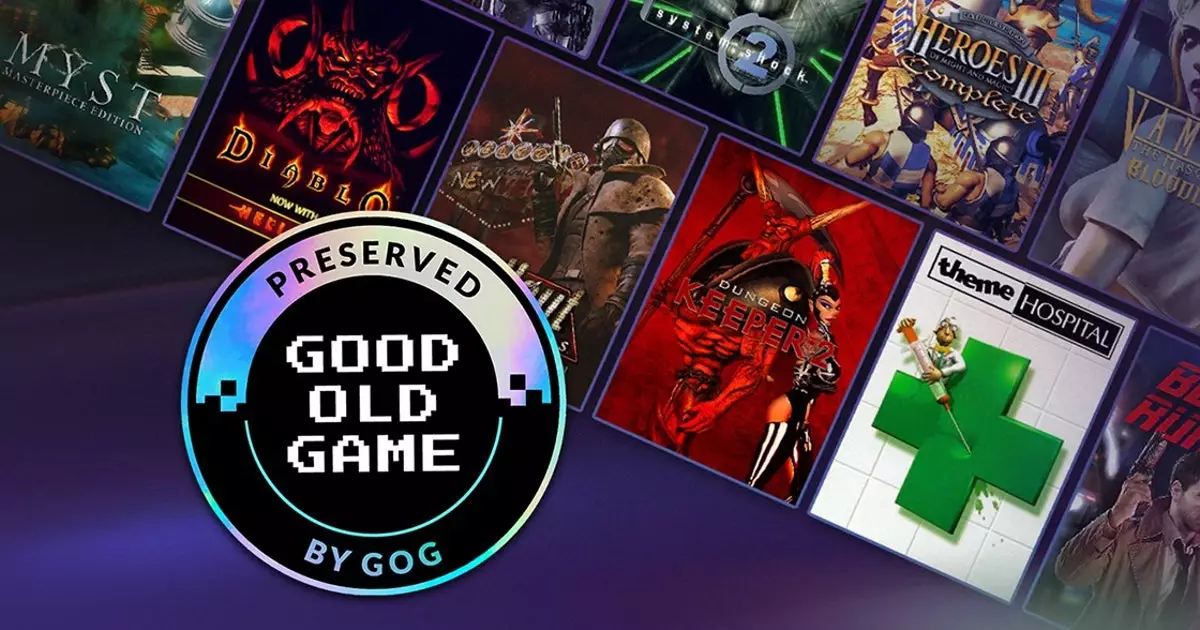Once heralded as the sanctuary for retro gaming enthusiasts, GOG (Good Old Games) has evolved its mission over the years. Initially established as a platform dedicated to classic games, the retailer recently embraced a broader catalog that includes modern blockbusters. This shift has transformed GOG into a seemingly dustier alternative to Steam, causing some to question whether the company remains committed to its principles of game preservation. Yet, with the launch of the GOG Preservation Program, the company is once again aiming to honor its legacy by revamping old titles for contemporary gaming platforms.
The new initiative signifies a strategic pivot back to GOG’s core ideals, intertwining their commitment to classic titles with efforts to make these games playable on modern hardware. With the “Good Old Game” badge, consumers can easily identify which titles have undergone enhancements, signifying that they are ready for uninterrupted gameplay without the burden of additional patches or modifications.
A key component of the GOG Preservation Program involves meticulous updating of older games. GOG’s developers work to eliminate bugs and integrate modern features, such as compatibility with newer operating systems like Windows 10/11. This approach mirrors Valve’s Steam Deck Verified system, aimed at providing gamers with assurance regarding a title’s performance on portable devices.
Titles that successfully navigate this enhancement process receive the aforementioned badge, confirming their status as “the most complete version available.” The program ensures that these games are not only free from Digital Rights Management (DRM) restrictions but also include all available downloadable content (DLC), expansions, manuals, and multilingual options. This dedication to completeness is poised to resonate with gamers who wish to access these nostalgic classics in their fullest form.
In a bold move to kickstart this initiative, GOG is reintroducing over 100 titles under this newly minted Good Old Games status. Fan-favorite classics like the original Resident Evil trilogy, Diablo, System Shock 2, and Vampire: The Masquerade – Bloodlines are returning, offering a comprehensive gaming experience free from the pitfalls of modern compatibility issues. The sheer number of classic titles on offer serves as a testament to GOG’s commitment to preserving gaming history while also catering to contemporary audiences.
However, this decision raises an essential question: what about newer titles? Enthusiasts may find themselves wishing for more recent hits to receive similar treatment, such as Fallout: New Vegas. This game, while relatively fresh in comparison to these offerings, often presents challenges for players due to hardware discrepancies and the necessity for extensive modding to run smoothly. By revitalizing these newer classics, GOG could satisfy both nostalgic players and modern gamers alike.
Despite GOG’s admirable goals, the path to preserving gaming history is fraught with obstacles. Successfully reviving classic titles necessitates cooperation from original developers and publishers, who may be reluctant to share their code. Furthermore, GOG is a business—one that ultimately must maintain profitability while promoting game preservation. Thus, balancing these interests can be a complicated endeavor.
Nonetheless, the importance of robust preservation initiatives cannot be overstated. The industry has seen multiple instances of beloved games becoming unplayable due to server shutdowns and other infrastructural issues. This concern has even led to legal disputes, with players seeking remedies for games rendered inaccessible by corporate decisions. Amid these mounting challenges, GOG’s renewed focus on preservation offers a glimmer of hope—a reminder that not all games can or should fade into obscurity.
A Vision for the Future
The GOG Preservation Program is a commendable step toward securing the heritage of video games, allowing players to relive their gaming past even as technology advances. With an ambitious aim to include all games—whether recent or classic—it represents a holistic approach to game restoration. As GOG continues its efforts, the gaming community watches expectantly, hopeful for a future where classic titles remain vibrant and accessible without the need for cumbersome patches.
GOG’s initiative highlights the company’s dual commitment to honoring gaming history while simultaneously innovating for modern audiences. As the debate over game preservation intensifies, the importance of platforms like GOG becomes increasingly apparent. By preserving our cherished gaming memories, they not only validate our nostalgia but also ensure that future generations can share in the excitement and joy these games bring.

